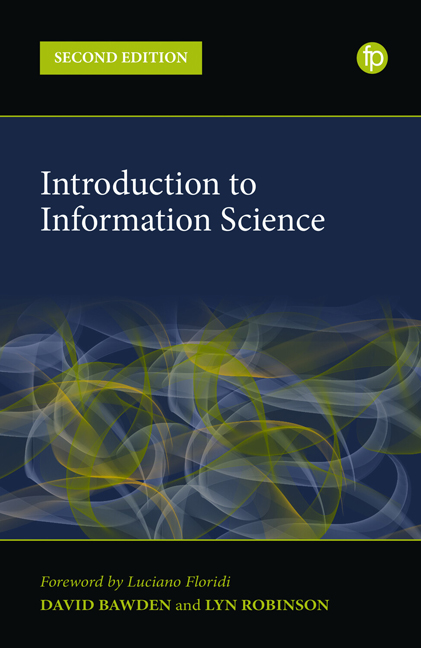Book contents
- Frontmatter
- Contents
- Figures
- Preface
- Foreword – Curators of Semantic Capital
- List of Acronyms
- 1 The Information Science Discipline
- 2 History of Information: the Story of Documents
- 3 Philosophies of Information
- 4 Paradigms, Turns and Theories in the Information Sciences
- 5 Information
- 6 Documents and Documentation
- 7 Domain Analysis
- 8 Information Organisation
- 9 Digital Technologies and Data Systems
- 10 Information Systems
- 11 Informetrics
- 12 Information Behaviour
- 13 Communicating Information: Changing Contexts
- 14 Information Management and Policy
- 15 Information Law and Ethics
- 16 Information Society
- 17 Digital (Onlife) Literacies
- 18 Research in the Information Sciences
- 19 The Future of the Information Sciences
- Additional Resources
- Index
Preface
Published online by Cambridge University Press: 21 April 2022
- Frontmatter
- Contents
- Figures
- Preface
- Foreword – Curators of Semantic Capital
- List of Acronyms
- 1 The Information Science Discipline
- 2 History of Information: the Story of Documents
- 3 Philosophies of Information
- 4 Paradigms, Turns and Theories in the Information Sciences
- 5 Information
- 6 Documents and Documentation
- 7 Domain Analysis
- 8 Information Organisation
- 9 Digital Technologies and Data Systems
- 10 Information Systems
- 11 Informetrics
- 12 Information Behaviour
- 13 Communicating Information: Changing Contexts
- 14 Information Management and Policy
- 15 Information Law and Ethics
- 16 Information Society
- 17 Digital (Onlife) Literacies
- 18 Research in the Information Sciences
- 19 The Future of the Information Sciences
- Additional Resources
- Index
Summary
The aim of this second edition remains that of the first edition: to provide a clear and succinct synthesis of the information science discipline, in as holistic a way as possible; to give the reader a grasp of the basics and a platform to go into all aspects in more depth. It is intended as an overview, showing the scope and the landscape of the subject. We have tried to examine, in reasonably consistent if brief way, all the aspects of the subject and their interrelations, while not allowing details to obscure the whole picture.
As with the first edition, the book is rooted in the scholarly and professional literature, with a substantial number of references. We hope that it may act as a useful sourcebook for the subject and a reminder that no textbook can be an alternative for engagement with the subject's literature. The conceptual and historical dimensions have been retained, since we feel that it is vital that students and practitioners alike have an appreciation of these, to complement more practice-focused materials.
The book has been substantially rewritten to reflect the great changes in the information environment. Compared to the first edition, there is a greater emphasis on theory, philosophy and ethics, on data and algorithms and on documents and documentation. The increasingly important links between information science and the newer disciplines of data science and digital humanities also receive more attention, as does the avoidance of misinfor - mation and disinformation. Chapter 3 of the first edition (Philosophies and paradigms of information) has been divided into two chapters, dealing with philosophies of information and with paradigms and theories in the information sciences, respectively. Similarly, the first edition's fourth chapter, which dealt with the basic concepts of the information sciences, has been converted into two, focusing on concepts of data, information and knowledge and on the concepts of documents and documentation. The chapter on information technology has also been divided, into one chapter on data handling and one on information systems. A new chapter on information law and ethics has been spun out from the first edition's chapter on information management and policy.
- Type
- Chapter
- Information
- Introduction to Information Science , pp. xv - xviPublisher: FacetPrint publication year: 2022



